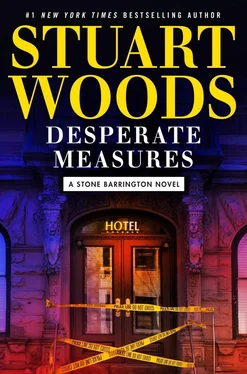“Two reasons. First, as I said earlier, the relative of our client has specified you. Second, the ADA on the case is Cheray Gardner.”
“Ah,” Herb said. He and Cheray had had a torrid, albeit brief, affair the year before.
“Did you part on good terms?”
“She still winks at me in the courthouse elevator.”
“I’ll take that as on good terms.”
“So will I,” Herb said. “Okay, who’s the relative?”
Ted sucked his teeth.
“I need to know that. I don’t want to be blindsided later.”
“First, let’s discuss your fees — with or without trial.”
Ted’s reluctance to reveal the name more than doubled what Herb had intended to ask. “Twenty-five grand, if I get him immunity. If it goes to trial, a hundred grand against a million-dollar fee, calculated at a thousand dollars an hour.”
“I can do that,” Ted said.
This indicated to Herb that Ted had already gotten an approval for the fees. “Then all I need is the name.”
“Mikeford Whitehorn.”
“He’s a relative?”
“A grandfather. Adams is his daughter’s son.”
“What’s the kid doing working at a fleabag hotel?”
“Let’s just say that Mike is something of a disappointment to his family. He’s not starving, though; he has a trust fund from grandpappy.”
“Okay, I’ll go for the deal, but I want permission to use Whitehorn’s name in my dealings with the ADA, and I want to talk to Whitehorn. Phone is okay.”
“I don’t know about that,” Ted replied.
“Tell old Swifty this: if it goes to trial, he’s going to be all over the papers and TV, guaranteed. The media will find out; they always do. However, if I can whisper his name into Cheray’s shell-like ear, it might carry some weight. It certainly will if she needs an approval from the DA himself to make the deal.”
“All right, but I don’t think you need to talk to grandpappy.”
“All right, but find a way to intimate to him that if he doesn’t know the DA, which he certainly does, but it would be gauche for him to make a call himself, then he might find a mutual acquaintance who can whisper to the DA that he should smile on immunity.”
“I can do that,” Ted said, “and I’m sure Swifty can, too.”
“Before I call Cheray.”
“Right after lunch.”
“When do I meet my client?”
“How about in an hour at Riker’s Island?”
“I can make that. Has anybody grilled young Mike about what he can give the DA?”
“I have. He says he’s worked with the janitor and the elevator operator for a year and a half, and he knows they did it, and he can shred any alibi they might have. And he keeps a diary.”
Herb looked at his watch.
“Give me a couple of minutes, and I’ll give you an answer,” Ted said.
Herb went to the men’s room, and when he came out, Ted was waiting in the entry hall.
“You can whisper, but not shout, grandpappy’s name,” he said.
“I’ll call you later this afternoon,” Herb said. “Thanks for the lunch.”
“My car and driver are outside. Take it to Riker’s and he’ll take you back to your office.”
They shook hands, and Herb went outside to the car.
Herb was let into a room containing two steel chairs and a table, all bolted to the floor. He sat down and tried to check his phone for messages, but there was no signal.
Five minutes later a guard opened the door, and a tall, slim young man with thinning dark hair and glasses entered the room. His handcuffs were removed and he shook Herb’s hand firmly. “I’m Michael Adams,” he said, then sat down.
“I’m Herb Fisher. Your grandfather has retained me to represent you.”
“He spoke to you directly?” Adams asked, sounding surprised.
“No, through your previous attorney, Ted Faber.”
“I’m glad he found you. Faber didn’t impress me.”
Herb was surprised at how calm and confident Adams seemed. In these circumstances, his clients were usually shaken and worried. “I’ve been told by Ted Faber that you’re willing to answer all the DA’s questions, in exchange for immunity from all charges.”
“Who wouldn’t?” Adams asked.
Herb smiled. “Of course, but I’m going to need to hear your story before I attempt to make that deal.”
“Okay, ask me whatever the DA will. This can be a rehearsal.”
“Let’s avoid that term and just call it a client interview.”
“Sure.”
“All right, Mike, give me your sixty-second biography, right up to this minute.”
“Born New York City twenty-nine years ago, educated at Buckley, had a shot at Yale, but didn’t make it there. Got my degree at Fordham.”
“Is your grandfather Catholic?”
“You guessed it.”
“And after Fordham?”
“I got into law school but left after a year.”
“What did you do for work?”
“My father got me a job at his commercial real estate firm, but it didn’t suit me. Neither did a couple of other things, but old Dad got me the night clerk gig at the hotel, which his firm owns. It suits me well. I can read and watch a lot of TV and, sometimes, work on my novel.”
“When did you begin?”
“A year and a half ago.”
“Any problems at work? You get along with your boss?”
“No problems. Everybody there works for my father’s firm, and my boss works days, so we don’t see each other that often.”
“When did you meet your two coworkers?”
“Sid Francis, the janitor, and Larry Cleary, the elevator operator?”
“Right.” Herb made a note of the names.
“They were already working there when I arrived. Nominally, I’m their boss; they’re night workers, too.”
“And who do you report to?”
“The assistant manager, Harmon Wheeler, Jr., who reports to the manager, Harmon Wheeler, Sr., who reports to my father’s firm.”
“And what were your first impressions of Sid, the janitor, and Larry, the elevator operator?”
“Slackers. They worked slowly, and they paid a lot of attention to the airline girls who stayed with us.”
“Flight attendants?”
“And pilots. They worked for a couple of charter airlines that had a deal with the hotel. Until recently.”
“What happened recently?”
“My dad’s firm decided to gut the hotel and remake it as something that would appeal more to business travelers, so the airline people looked for beds elsewhere.”
“How recently?”
“A few weeks ago. There’s very little business now because as their contracts expire, they aren’t renewed.”
“So Sid and Larry liked the girls.”
“They did and do. Their problem was the girls didn’t like them much. Their approaches tended to get rebuffed, so I guess they looked elsewhere.”
“With what result?”
“I noticed that Sid and Larry tended to disappear for an hour or two late at night — rarely together — one at a time. Sid would cover the elevator when Larry was gone.”
“Did you know where they went?”
“I assumed they were taking naps or watching porn in one of the vacant bedrooms. I found some videos in a room on the second floor once, when I was making my rounds.”
“How often did you make rounds?”
“When I felt like it, which was not often, but I got curious about where Sid and Larry were going, and I couldn’t catch them actually in a room. Then, last week, I noticed the door.”
“What door?”
“On the top floor. It’s a pull-down door to what I assumed was the attic.”
“Did you have a look up there?”
“Once. I found that you could get into the attic in the building next door from there.”
“Did you explore that further?”
Читать дальше












